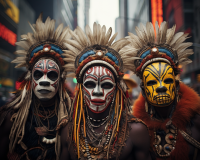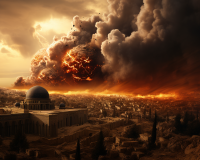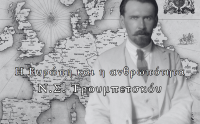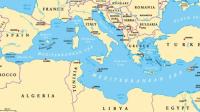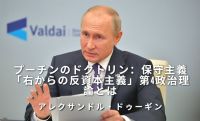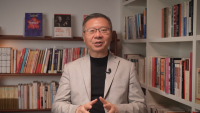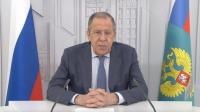Civilization
「中東・終末論的シナリオ」
「南コーカサスの地政学について」
「多極世界の終末論」
ロシア国民に
「地理詩学」
“アフリカのロシアファンへのご挨拶:ロシア・アフリカフォーラム”
迫り来るロシア動乱の脅威
覚醒のテーゼ:朝の呼びかけ
反乱後の岐路
Η Ευρώπη και η ανθρωπότητα
Φέρνω το παρόν έργο στην προσοχή του κοινού όχι χωρίς κάποια ανησυχία. Οι ιδέες που εκφράζονται σε αυτό πήραν μορφή στο μυαλό μου πριν από δέκα και πλέον χρόνια. Από τότε τις έχω συζητήσει συχνά με διάφορους ανθρώπους, επιθυμώντας είτε να επαληθεύσω τις δικές μου απόψεις είτε να πείσω άλλους. Πολλές από αυτές τις συζητήσεις και αντιπαραθέσεις ήταν αρκετά χρήσιμες για μένα, διότι με ανάγκασαν να επανεξετάσω τις ιδέες και τα επιχειρήματά μου με μεγαλύτερη λεπτομέρεια και να τους δώσω πρόσθετο βάθος. Όμως οι βασικές μου θέσεις παρέμειναν αμετάβλητες.
地中海の多極化:より良い未来への挑戦
ロシア特殊軍事作戦の実存的正当性
アンドレイ・コロボフ=ラティンツェフの言葉を引用し、総動員をユンゲルの概念として捉え、ユンゲルのモデル自体を基に話を進めたいと思います。ユンゲルのモデルは明白であり、ある意味でこれ以上の深掘りは不要です。エルンスト・ユンガーは非常に明瞭な思想家で、彼の言葉はアフォリスティックな特徴が強いです。彼は自分が表現したいことを作品でしっかりと述べており、彼が言いたいことは明確です。そのため、彼についてのコメントもそれほど興味深いものではありません。ただし、マルティン・ハイデガーの100巻に及ぶ著作の中には、ユンゲルの著作の復刻版が含まれています。そこにはハイデガー自身による余白に書かれた注釈が含まれていて、これは非常に興味深いものとなっています。ここで、ハイデガーの多次元的で精神的な知的世界の中でユンゲルの思想が統合されているのを見ることができます。そして、ユンゲルの総動員の考えをハイデガー的な視点で捉えると、動員に関する実存主義的な理論が得られます。これは、実際に意図されていることです。これをさらに詳しく探ることは価値があると言えるでしょう。
反資本主義の右翼
プーチンのドクトリン:保守主義「右からの反資本主義」第4政治理論とは
マルチモダンと中国的近代化
多極化に関する世界会議 スピーチ「多極化と文明国家の台頭」
多極化に関する世界会議 スピーチ① マリア・ザハロワ
多極化に関する世界会議 スピーチ ① 木村三浩 日本国愛国者団体「一水会」代表
多極化に関する世界会議 スピーチ ① セルゲイ・ラヴロフ外相 参加者と主催者へのビデオメッセージ。(モスクワ、2023年4月29日)
多極化に関する世界会議 スピーチ ① コンスタンチン・マロフェーエフ
多極化委員会
多極化世界論における第二世界・半周辺国と文明国家について
今日の汎アフリカ主義。新植民地主義から多極化へ
COUNTER-HEGEMONY IN THE THEORY OF THE MULTIPOLAR WORLD
Although the concept of hegemony in Critical Theory is based on Antonio Gramsci’s theory, it is necessary to distinguish this concept’s position on Gramscianism and neo-Gramscianism from how it is understood in the realist and neo-realist schools of IR.
The classical realists use the term “hegemony” in a relative sense and understand it as the “actual and substantial superiority of the potential power of any state over the potential of another one, often neighboring countries.” Hegemony might be understood as a regional phenomenon, as the determination of whether one or another political entity is considered a “hegemon” depends on scale. Thucydides introduced the term itself when he spoke of Athens and Sparta as the hegemons of the Peloponnesian War, and classical realism employs this term in the same way to this day. Such an understanding of hegemony can be described as “strategic” or “relative.”
In neo-realism, “hegemony” is understood in a global (structural) context. The main difference from classical realism lies in that “hegemony” cannot be regarded as a regional phenomenon. It is always a global one. The neorealism of K. Waltz, for example, insists that the balance of two hegemons (in a bipolar world) is the optimal structure of power balance on a world scale[ii]. R. Gilpin believes that hegemony can be combined only with unipolarity, i.e., it is possible for only a single hegemon to exist, this function today being played by the USA.
In both cases, the realists comprehend hegemony as a means of potential correlation between the potentials of different state powers.
Gramsci's understanding of hegemony is completely different and finds itself in a completely opposite theoretical field. To avoid the misuse of this term in IR, and especially in the TMW, it is necessary to pay attention to Gramsci’s political theory, the context of which is regarded as a major priority in Critical Theory and TMW. Moreover, such an analysis will allows us to more clearly see the conceptual gap between Critical Theory and TMW.

